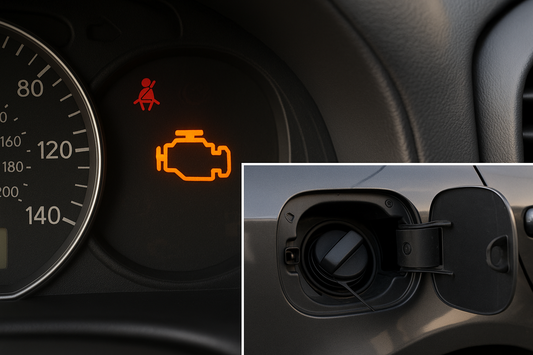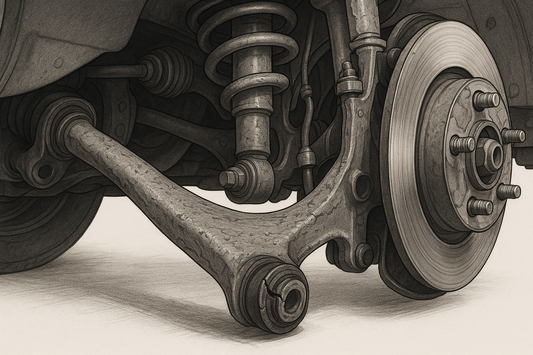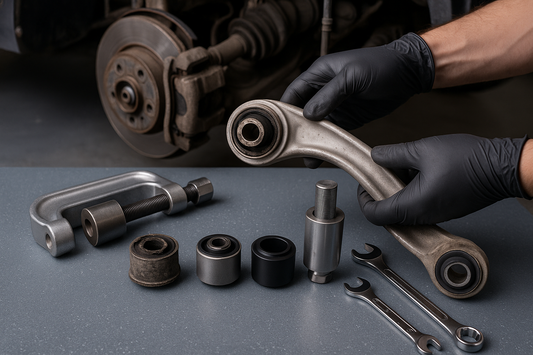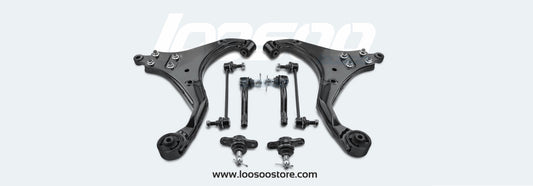The control arm (or control arm assembly, suspension arm) is a critical component in a vehicle's suspension system. It connects the body to the wheels and withstands various shocks and vibrations from the road. When the control arm fails, it will not only affect driving comfort and safety, but may also cause damage to other parts of the vehicle. In this article, we will discuss in detail the possible consequences of a control arm failure and what vehicle owners should do if they experience such a problem.
The Role of Control Arms and Their Importance
The control arm is a key component in the suspension system of a car, and its main function is to connect the wheels with the body and withstand the longitudinal, lateral and lateral forces transmitted by the wheels. Through the action of the control arm, the suspension system can ensure good contact between the wheels and the ground, and at the same time reduce the impact and vibration of uneven road surface on the body. Therefore, the state of the control arm directly affects the handling, stability and ride comfort of the vehicle.
Possible consequences of control arm failure
Decrease in maneuverability
When a control arm fails, the connection between the wheels and the body becomes unstable, causing the driver to have difficulty in maneuvering the car. The vehicle may experience problems such as directional drift and unresponsive steering, which can seriously affect driving safety.
Reduced Stability
When the control arm fails, the function of the suspension system is affected and the vehicle may sway and lurch while driving. This not only reduces ride comfort, but may also increase the risk of traffic accidents.
Increased tire wear
Due to inaccurate wheel alignment as a result of control arm failure, tires may be subjected to abnormal wear and tear. This not only shortens the life of the tires, but may also affect the handling and stability of the vehicle.
Damage to other suspension components
When a control arm fails, additional stress may be placed on other components of the suspension system. Prolonged operation in this condition may result in damage to other parts of the suspension system such as shock absorbers and ball joints.

How to deal with control arm failure
Immediately stop and check: Once the vehicle is found to have abnormalities such as reduced handling and stability, the driver should immediately stop and check. If it is found that the control arm is obviously damaged or loose, do not continue to drive, so as not to aggravate the damage or cause more serious problems.
Seek professional repair: Take the vehicle to a professional auto repair store for inspection and repair. Repair technicians will scrutinize the control arms and replace or repair them as appropriate. At the same time, they will also check other parts of the suspension system to ensure that the entire system is functioning properly.
Regular Maintenance Inspection: In order to prevent problems such as control arm failure from occurring, vehicle owners should have their vehicles inspected on a regular basis. During the inspection, the maintenance staff will carefully check the various components of the suspension system, including the control arms, shock absorbers, ball joints, etc., to ensure that they are in good condition.
Pay attention to driving habits: Good driving habits can reduce the impact and wear on the suspension system. Drivers should avoid drastic driving behaviors such as rapid acceleration, rapid braking and sharp turns to reduce the damage to the suspension system components such as the control arm.
As an important part of the suspension system, the control arm directly affects the handling, stability and ride comfort of the car. When the control arm fails, it will not only affect driving safety, but may also cause damage to other parts of the vehicle. Therefore, car owners should carry out regular maintenance and inspection of the vehicle, timely detection and treatment of control arms and other suspension system components. At the same time, paying attention to driving habits is also an effective way to reduce the wear and tear of suspension system components.










